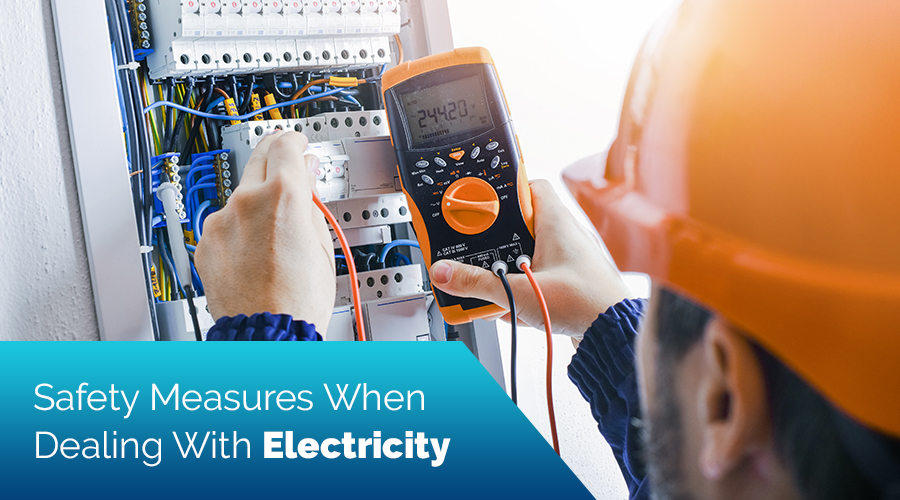The importance of taking safety measures while dealing with electricity cannot be overemphasized. Without proper precautions, anything from a fire hazard to electrocution can occur wrecking both lives and properties in the process. This is why one must adhere to safety rules where electricity is concerned.
To begin with, never try to fix any electrical issue if you have no prior training for this task. Only licensed electricians are allowed to embark on electrical services in a building, following laid out regulations. By flouncing this rule, you are already putting yourself in the way of danger. Get a local electrician in London that you can trust to handle your electrical services.
Table of Contents
Here are some safety measures to enforce when dealing with electricity:
Avoid water
By now you know that water and electricity are usually not on friendly terms. If you are going to carry out any electrical job, even as little as plugging in appliances, ensure that your hands are totally dry. If your appliance falls into water or wet ground, turn off the switch before trying to remove the appliance. Water generally increases the conductivity of electricity, making the person handling the appliance susceptible to electric shocks, which can be fatal
Replace damaged equipment
If your electrical equipment has been in use for a while, chances for wears and tears of insulated parts are increased. Once you notice frayed cords and broken plugs on equipment, do not use the equipment.
Turn off the mains during work
When you are undertaking any form of electrical work on any receptacle, ensure that you turn off the power supply to the mains. To avoid a mistake, create awareness in the building about your reason for turning it off. You can display a bold sign on the mains in case someone goes to try to turn it back on without your knowledge.
Insulated tools
Insulated tools will not allow electric current pass through them. Do not go about inserting tools with high conductivity into electrical sources.
Observe signs and follow them
There are some unguarded electrical equipment and energised parts that are left exposed. This is very risky as energy can come into these parts at any unexpected moment. Most times, these equipment and tools have signs like “Shock risk” displayed on them. Do well to observe these signs and follow the stated rules guarding the equipment.
Wear protective clothing
You might see this step as unnecessary. However, this is a very important step. If you are going to carry out any electrical work on a circuit in a building, ensure that you are fully protected. Wear dry clothing and use rubber gloves and goggles to protect your eyes and skin.
Use a tester to confirm the status of equipment
Before you try repairing any electrical equipment, ensure that it is de-energised. You can confirm this by using a tester on the wires and metallic panel covers. If there is still current, a bulb will be lit inside the tester. This shows that the equipment is still energised, quickly disconnect from the mains, recheck with the tester, and then proceed.
Do not use conductive ladders
When you need to climb ladders to carry out a job, ensure that the ladders are not made of copper or aluminium. These materials are very conductive, and in the case of a surge, your whole body becomes conductive. Use wooden or fibreglass wires instead.
Regularly inspect your GFCIs
These safety devices have helped prevent a lot of hazards in homes. They function by detecting the slightest malfunction in electric current and disconnecting general power immediately. If your home does not have this, then it needs it. If it does have it, ensure that it is inspected regularly (once a month) to ensure that it is functioning.
Be careful while soldering your circuit boards
When using your soldering iron, you must watch it carefully. And When it is not in use, ensure that it is safely tucked in its board. When it is in use, wear protective clothing like goggles and gloves to avoid a hazard.
Working on underground cabling
The soil around underground cables can be conductive, especially when damp. Using a spade to dig is not also safe as it can strike a cable and damage it. The safest way to work underground is to wear insulated gloves and use your hands to dig.
Carefully remove capacitors from circuits
Since capacitors store charge, it can be released on the hand in contact while trying to remove it from circuits. Ensure that all charges are properly dissipated. You can do this, by putting an insulated screwdriver on the terminals of the capacitor, or using a bulb for high voltage capacitors. The stored current will be drained, leaving the capacitor harmless.
Put a cap on the live wire while working on it
This cap will serve as an insulator for the copper ends of the cable, preventing the flow of current.
Use a circuit breaker with appropriate ratings
These safety devices disconnect the power supply when a short circuit is detected. Ensure that you choose a breaker with the right ratings. It is advisable to have a local electrician near me in London to attend to all your electrical needs. Call us today if you need professional help.





